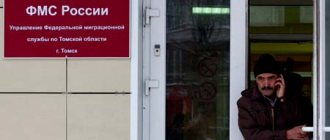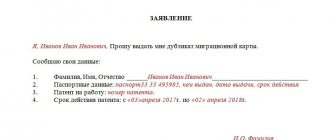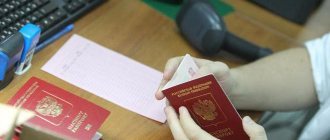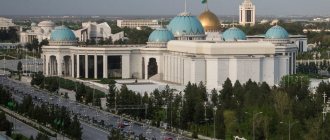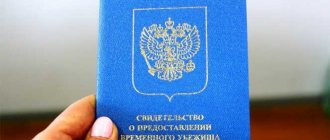Law on the use of foreign rights in Russia
Discussions about adopting a ban on working with a foreign driver's license have been ongoing in the country's government for a long time. In 2013, Federal Law No. 92-FZ was adopted, which introduced restrictions on driving vehicles with the rights of other states.
The new law on driver's licenses included a provision that implied the exchange of a foreign document, which would not be valid in the country, for a Russian license. It gained legal force only 4 years later.
From June 2021, professional drivers from the CIS countries are required to exchange the license received in their country for an identical national document. Therefore, the question of whether it is possible to drive with a foreign license in Russia disappears in itself.
Until June 1, 2021, a migrant was allowed to drive a vehicle on the basis of a license that complied with the Vienna Convention. Everything changed with the entry into force of paragraph 38, paragraph 2, art. 1 of Law No. 92-FZ, which became an addition to the law on driver’s licenses.
Advice! Bus drivers, taxi drivers, courier delivery employees, as well as people transporting goods should obtain a Russian license. Naturally, if this procedure has not been carried out previously.
Rights of foreign citizens in the Russian Federation
Stable employment and high earning potential attract compatriots from the CIS countries and neighboring countries. Many of them perceive Russian culture as their native one, which greatly facilitates the process of adaptation to local life. The state is trying to build immigration policy in such a way as to take into account risk factors in this regard.
Foreigners who have lived in the Russian Federation for a long time often apply to change citizenship in order to fully enjoy all available rights, but the majority live according to the “arrive and leave” principle. We know the procedure for obtaining citizenship from collecting documents to receiving a positively accepted decision from the migration authority.
Foreigner is a fairly broad concept, as it includes stateless persons, refugees, and those temporarily staying in the country. All of them are provided with equal protection of the rights of foreign citizens in accordance with the basic law of the Russian Federation:
- We are talking about personal rights (freedom of religion, inviolability of home)
- economic, cultural and social. This provides an opportunity to develop work activity, engage in education, qualify for full medical care, and relax freely.
However, there are some restrictions. First of all, they relate to political rights and land ownership in border areas. Land lease is available to foreigners on very favorable terms, if you do not take into account new trends in protecting national interests in connection with economic sanctions from the EU.
Another important point is the right to judicial protection. They can appeal not only to local authorities, but even to the Constitutional and Supreme Court of the Russian Federation. This opportunity provides foreigners with certain guarantees that they can safely develop their business and invest in new projects.
When is it not necessary to change a document?
According to the published law, Belarusians and citizens of Kyrgyzstan do not need to retake the traffic rules. There are several situations in which a migrant will not need to replace his driver’s license:
- The person driving the car is involved in transportation to international destinations;
- A person does not use a car for the purpose of generating income (for example, driving his own vehicle or a car rented under a car sharing agreement).
In the above cases, the rights must comply with international agreements in force on the territory of Russia. All data in the rights must be duplicated in English. A document with a notarized translation is also suitable. In addition, it is planned to exempt Kazakhstanis, as well as citizens of Moldova and Uzbekistan, from registering new rights.
Fines for ignoring the law
If a person with citizenship of another country is registered with government agencies as an entrepreneur transporting goods or passengers, or is hired as a driver at an enterprise, he is obliged to replace the certificates. You can recognize the fact of traveling by car for commercial purposes by the presence of a waybill. Without such a document, transportation of goods or transportation of passengers is impossible.
Attention! Failure to comply with legislative norms will be punishable by imposing a monetary penalty on the migrant from 5 to 15 thousand rubles. In this case, the employer will receive a fine of 50,000.
Procedure for replacing foreign rights
To replace a foreign driver's license with a Russian one, a migrant must provide a certain list of documents to the traffic police department. In addition, he is obliged to take care of paying the state fee and passing a medical commission. The complete list of papers is as follows:
- The original document confirming the identity of the applicant (passport), as well as its copy;
- A document capable of confirming a person’s officially permitted stay on the territory of the Russian Federation (migration card);
- Completed application;
- A document confirming the passage of a medical commission;
- Driver's license;
- A document confirming payment of the state duty to the MFC (the amount is two thousand rubles).
The specified documents are submitted to the traffic police, located at the migrant’s registration address. Citizens of the Russian Federation can submit papers to the nearest traffic police department. When they are reviewed, a decision is made to replace and admit the person to the exam.
Exam
To the question of how to exchange a foreign license for a Russian one, there is only one answer: exclusively after passing the standard examination stages, which are accepted by traffic police officers. For this procedure, the traffic police employ police officers who travel with the person being examined and check his ability to drive a car. Exam stages include:
- Ticket theory;
- Practical driving on a race track;
- Practical management in urban conditions.
Until 2014, migrants were tested exclusively on the theoretical part.
If a foreign license has been issued to a person for several categories, then the exam is taken according to the highest of them. If all parts of the test are successfully passed, the person receives a Russian driver's license.
Foreign licenses that do not meet the requirements of international treaties in the field of preventing dangerous road situations cannot be exchanged with an identical Russian document. It will be possible to become the owner of a driver’s license only after attending a driving school and passing an exam at the State Traffic Safety Inspectorate using the general rules.
A person can get their foreign license back along with the issuance of a Russian document. A note about driving experience will be placed in paragraph 14 of the new driver’s license.
Topic 11. Relationships of foreign citizens with other government bodies of the Russian Federation
1. How does the Ministry of Internal Affairs of Russia stand for?
Ministry of Internal Affairs of Russia.
2. What is the purpose of the police? What powers does the Russian police have?
The police are intended to protect the life, health, rights and freedoms of citizens of the Russian Federation, foreign citizens, stateless persons (hereinafter also referred to as citizens; persons), to combat crime, protect public order, property and to ensure public safety.
3. Can a foreign citizen become a police officer of the Russian Federation?
Can not.
4. What are the fundamental rights and responsibilities of the police? (detain a person, gain access to premises, check a passport, search for missing persons)
All of the above.
5. Who receives and records statements and reports of crimes and incidents? Can a police officer refuse a foreign citizen to register a statement about committing a crime?
Police and prosecutors. Can't refuse.
6. What is the procedure for a police officer to contact a citizen? When contacting a citizen, is a police officer required to present his official ID? When contacting a citizen, is a police officer required to state the reason and purpose of the request?
Full name, position, department where the employee works. Only upon request. Must.
7. What documents does a police officer have the right to check from a migrant?
Identity document, documents confirming legal stay on the territory of the Russian Federation.
8. How is the TIN deciphered?
Individual Tax Number.
General grounds for obtaining rights
If it is not possible to exchange a driver’s license for foreign citizens under the new law, the person is obliged to change the license according to the general rules. He will have to go through the following stages:
- Driving school training. To begin with, an educational institution is selected, payment is made for a course of lectures, the theoretical part is listened to, and the internal exam is successfully passed. The institution has the right to enroll only those migrants who provide a document confirming registration in the country. As confirmation of training, a person receives a certificate of completion of a course of lectures.
- Medical commission. To obtain the right to drive vehicles, this point is mandatory. For citizens of any country the service will be paid. The certificate can be obtained from a health care institution.
- Payment of the state fee and provision of a medical certificate to the traffic police along with a certificate of training at a driving school. Based on these documents, the person will receive permission to take the exam at the traffic police.
- Passing the traffic police exam. For a positive result, you need to pass a test of knowledge of theory, as well as demonstrate your practical skills in the conditions of a race track and city streets.
If the above stages are successfully completed, the migrant can apply for a Russian driver’s license.
Is a foreign citizen required to carry a passport with him at all times?
Many foreigners who come to Russia to work or as tourists wonder: is it necessary to always have a passport and other migration documents with them, such as a migration card, “registration”, patent (in case of official employment in Russia) and the like.
Based on the laws in force in Russia today in the field of migration, we can conclude that identification of persons in the Russian Federation is carried out on the same basis, regardless of whether they have Russian citizenship. The differences are caused only by the type of document that a person presents for identification purposes. Let's take a closer look.
According to Article 10 of the Federal Law of July 25, 2002 N 115-FZ “On the legal status of foreign citizens in the Russian Federation” , the main document identifying a foreign citizen in the Russian Federation is, first of all, his passport , issued by a foreign state. However, it is important to understand that the legality of staying in the country cannot always be confirmed only with a passport.
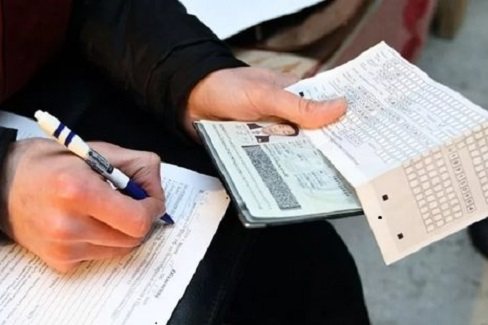
Checking documents is always an unpleasant procedure.
What documents should a foreign citizen have with him while in Russia? of such basic identifying documents:
- passport (with a valid visa, if required, or a border crossing stamp);
- migration card (it confirms the right of a foreign citizen who arrived in the Russian Federation in a manner that does not require a visa to temporarily stay in the Russian Federation, and also serves to control the temporary stay of a foreign citizen in the Russian Federation);
- «registration"(and legally - "tear-off form for notification of arrival at a place of temporary stay"). Separately, this document cannot be considered as a basis confirming the right of a foreign citizen or stateless person to temporarily reside in the Russian Federation. You need to carry it with you only in conjunction with the two above.
According to Article 22 of the Federal Law of July 18, 2006 N 109-FZ “On migration registration of foreign citizens and stateless persons in the Russian Federation”, a foreigner presents a passport and a migration card at a hotel or hostel, and the hotel (“host party”) sends a notification about its arrival at the migration registration authority directly or through the MFC or sends it in the prescribed manner by post.After the receiving party sends a notification of his arrival at the place of stay, the foreigner receives from her a detachable part of the specified notification form. And if a foreign citizen has ownership rights to residential premises located on the territory of the Russian Federation, he can declare such premises as his place of residence.
The migration card confirms the legality of stay in the Russian Federation in the presence of a passport identifying the card holder.
It is advisable to always have the above documents with you, so that in the event of a document check on the street or a raid by the migration services of the Ministry of Internal Affairs, there will be fewer questions for a foreign citizen.
All of the above documents have expiration dates, so it is important to keep track of them. You need to ensure that your foreign passport is valid and, if necessary, replace it at the consulate of your country. It is important that the migration card is not expired, and that the registration at the place of residence is valid.
It is also necessary to warn foreign citizens against processing the above documents by various private intermediaries. The fact is that all data from the migration card and registration is now immediately entered into electronic databases, so it is necessary to formalize everything officially through the migration control authorities (when crossing the border this is the border service of the FSB of Russia, and inside the country - the corresponding territorial department for migration issues of the Ministry of Internal Affairs of Russia ).
In accordance with Article 4 No. 115-FZ “On the legal status of foreign citizens in the Russian Federation” , foreign citizens enjoy rights in the Russian Federation and bear responsibilities on an equal basis with citizens of the Russian Federation, except for cases provided for by federal law. Accordingly, the current migration legislation does not oblige a foreigner or stateless person to always carry an identification document with him. “On the procedure for leaving the Russian Federation and entering the Russian Federation” does not contain the obligation to constantly carry an identification document with you .
Foreign citizens have the right to freedom of movement for personal or business purposes within the Russian Federation on the basis of documents issued or executed by them in accordance with the Federal Law, with the exception of visiting territories, organizations and objects for entry into which, in accordance with federal laws, a special permit is required permission.
The law established that a foreigner legally present in Russia is a person who has a valid residence permit, or a temporary residence permit , or a visa and (or) migration card , or other documents provided for by federal law or an international treaty of the Russian Federation confirming the right of a foreign citizen to stay (residence) in the Russian Federation.
The period of temporary stay of a foreign citizen in the Russian Federation is determined by the validity period of the visa issued to him. The visa can be paper (pasted into the passport) or electronic. Residents of the CIS countries and many others (for example, most citizens from South America) do not require a visa to the Russian Federation (including an electronic one) (in this case, the period of stay is ninety days in total during each period of one hundred and eighty days. When entering the Russian Federation, it is enough have a passport, hotel reservation or invitation with you. It is advisable to have a return ticket (a simple printout of the reservation will do).
If you are a foreign citizen and want to officially work (carry out labor activities in the Russian Federation) and do not need an entry visa, you need to apply for a so-called work patent
A patent is a document confirming the right of a foreign citizen to temporarily carry out legal labor activities in a specific territory.
To obtain a patent, a foreign citizen, within thirty calendar days from the date of entry into the Russian Federation, must write an application for its issuance to the territorial body of the federal executive body in the field of internal affairs, not forgetting to attach to this application:
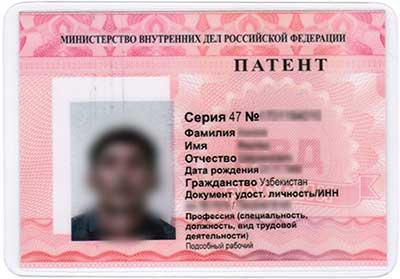
Working legally in Russia is easy - just have this document with you.
- passport;
- migration card (it is very important that the purpose of the visit to the Russian Federation indicates work and not tourism );
- voluntary health insurance policy;
- documents issued based on the results of a medical examination confirming the absence of drug addiction and chemical and toxicological studies of the presence of narcotic drugs in the human body;
- certificate of absence of HIV infection . The specified documents and certificate can be obtained from medical organizations located on the territory of the Russian Federation (including commercial ones);
- a certificate confirming the foreign citizen’s proficiency in the Russian language, knowledge of the history of Russia and the fundamentals of legislation, or a state document on education (at a level not lower than basic general education), issued by an educational institution on the territory of a state that was part of the USSR before September 1, 1991 or a document on education and (or) qualifications issued to persons who have successfully passed the state final certification on the territory of the Russian Federation since September 1, 1991;
- documents confirming the registration of a foreign citizen at the place of stay.
It is important to understand that according to the law, refusal to accept a patent application is not allowed, except in the case of failure to provide any of the above documents. You don't need to carry your patent with you all the time. But it is advisable to have it at the place of work.
Thus, despite the fact that the laws of the Russian Federation do not officially oblige foreigners to carry all of the above documents with them, it will be practically useful to still have them with them in order to confirm the right to legally stay in Russia or the right to work under a patent in the event of an inspection documents from official officials.
Reasons for refusal to issue rights
A migrant may not only be denied access to take the qualification exam, but may not even accept the person’s application. The reasons for such actions are presented in the table.
| Refusal to accept an application | Denial of admission to the exam |
| • Absence of one or more documents, according to the list in the rules; • Submission of an overdue document (except for foreign rights); • The presence of notes made in pencil, or uncertified corrections or erasures. | • The migrant has not reached the age at which he can be admitted to the exam in the relevant category; • Lack of conclusion from a medical commission; • Lack of a certificate of completion of theoretical training at a driving school; • Failure of the foreign applicant to meet the requirements specified in paragraph 26 of the Rules; • Presence of offenses implying deprivation of rights; • Submission of documents containing false information; • Submission of papers or documents whose authenticity is in doubt or considered lost or stolen. |
Any refusal to apply for a Russian driver's license for migrants must be sent to him in writing. This official document must contain a statement of the reason for the refusal.
If a citizen of another country plans to move to Russia for permanent residence and get a job as a driver, he must remember the need to replace his license with a Russian document. If a person ignores such a requirement of the law, penalties in the form of a monetary penalty may be applied to him. In addition, the migrant's employer will also be fined. It is better to protect yourself and not once again come to the attention of regulatory authorities.
